“Within the urban sprawl of almost any great city there is an almost infinite number of variations in human behaviour. Millions upon millions of people going about their everyday business. Unfortunately, we shall also find gambling, alcoholism, drug addiction, pornography and every conceivable kind of licentiousness. Recently a new novelty has been added to this list: wife swapping. While every incident depicted in this film is based on fact, it is only concerned with a minority group. It is an aspect of modern life which we present in truth.”
That’s the terribly serious opening narration of The Wife Swappers. It’s pretending to be a terribly serious film, an exposé of the new sexual mores infesting suburbia at the end of the 60s, sagely informing us of the psychology behind it all – but as with all sexploitation films what it’s really about is showing the punters as many naked ladies as the filmmakers can get away with. As far as The Wife Swapperswas concerned that strategy certainly paid off at the box office (it was the film that really opened the British sex film floodgates, leading to the market saturation of the 70s), but I find it hard to imagine anybody getting seriously aroused by it. Well, what do I know? The film epitomises the grottiness of British sexploitation and, although I’m pretty sure it wasn’t the intention, manages to make heterosexual relationships, and human beings in general, look entirely unappealing. I don’t think it’s meant to be quite as thoroughly hilarious as it is either: the passing years have transformed it into a time capsule of ludicrous late 60s fashion and décor, and the sternly disapproving attitude (which was probably tongue in cheek to begin with) has aged into the height of camp. For me this is the ultimate British sexploitation movie: I absolutely love it and I beg your indulgence as I’ll be describing the film in detail, with particular attention to the charmingly ridiculous script.
We’re hooked in with a great ‘what-the-hell’s-going on?’ pre-credits teaser: A woman in a black plastic mac (and matching hat) stands on Westminster Bridge, minding her own business. Suddenly a car pulls up and two thugs in dark glasses pull her inside. Blindfolding her with her bright pink chiffon scarf they drive her into the countryside and drag her to the river, where a boat’s moored on the other side. They take off her mac (she’s naked underneath), and she swims out to the boat. Climbing aboard, she disappears over the side. We hear a scream and the blood red title ‘The Wife Swappers’ spins into view – accompanied by an ‘all characters and events in this film are fictional…’ disclaimer that rather spoils the narrator’s claims of veracity.
Next up are some wonderfully uncomfortable vox pops shot in central London, asking people of various nationalities what they think of wife swapping. I’m not sure if they’re real members of the public or not but the interviews certainly feel stilted enough for them to be. A hippie couple dismiss the notion of having a wife to swap, a Swedish pair are blasé about the whole thing, and a Canadian man practically salivates at the thought, much to his wife’s disapproval. We launch now into the first of several ‘reconstructions’: the story of suburban dullards Paul and Ellen and their journey into the world of swinging.
‘I was certainly confused that evening as Paul, my husband, drove me towards my first meeting with an organised wife-swapping club’, begins Ellen’s earnest narration, accompanying shots of actress Valerie St John, her face a picture of wide-eyed gormlessness. ‘Let us recreate the moment when Ellen first heard the phrase wife-swapping’ says the narrator, and they do. Paul and Ellen are in their glorious suburban home and have just put their young daughter to bed, when Paul announces that Leonard and Jean are coming over, much to Ellen’s dismay. All the men in The Wife Swappers are ugly, and lothario Leonard is the most fearsome-looking of all. Played by Larry Taylor, a familiar bit-part actor whose most impressive credit is perhaps playing Captain Birdseye in South Africa, Leonard’s ogre-like face and gap-toothed leer compete with his lemon yellow shirt and cornflower blue cravat to be the most unpleasant aspect of his appearance. He’s obviously a charmer though: the initially unimpressed Ellen is quickly won over when he helps her to empty the ice cube trays, gives her his killer line – ‘you’re no ice cube’ – and proceeds to maul her. Wife Jean is a badly dubbed tarty blonde (actually there are only two women in the whole film who aren’t blonde) who seriously has the hots for the rather careworn Paul.
A game of poker leads in to a more risqué game involving corks and undressing, and eventually the promised wife swapping. ‘As I left the room that night I was aware that something new had entered my life’ Ellen tells us, and she and Paul have sex that night for the first time in ages.
Now Paul and Ellen head to a proper wife-swapping party, where all the men wear dark glasses and all the women wear feathery masks. Ellen’s first choice of sexual partner is the most attractive man of the group (relatively speaking), although he’s also one of the campest men I’ve ever seen. A repentant Paul watches in horror, their coupling reflected in his dark glasses.
‘An eminent London psychiatrist’ (i.e. a hammy actor), coquettishly leaning against his bookshelves, gives us the benefit of his thoughts on these goings-on, sniffily blaming ‘woman’s drive for so-called equality’ for everything that’s wrong with society.
Alleged reconstruction number two involves a young husband and wife taking a holiday with another couple on their boat (probably the same one we saw earlier). Boating and swinging clearly go hand in hand – we learned in the last story that Leonard had one too. Our innocent pair don’t realise that their friends are sinister swingers who plan to seduce them. The plan doesn’t work. ‘Our married life was such that we’d never needed to indulge in such behaviour’, the offended wife tells us in voiceover.
Following this there’s a brief investigation of ‘contacts’ magazines – a newsagent introduces us to some of his dodgier wares and gives us his theories on the lonely folk who buy them and Joe, the slippery editor of one of the mags, strenuously denies that he wants to do anything other than help people make new friends.
Next up, a woman in silhouette cheerfully tells us all about her descent from wife swapping to prostitution and her husband’s prison sentence for pimping her. ‘I found a young boy and he wanted to beat me – it was rather funny!’ she merrily reminisces. ‘I don’t think he wanted to pay me!’ The stern interviewer asks if she’ll continue with this life. ‘Oh yes! Well it would be silly not to, wouldn’t it? No income tax…’ ‘I suspect this woman is much less secure than she pretends to be’, the psychiatrist reassures us.
We’re now taken inside a nightclub by the magic of a supposedly hidden camera, where a woman casually strips off on the dancefloor, and others join in. ‘Such is the progress of the permissive society’ tuts the narrator, ‘that such an exhibition as this can occur with hardly a ripple of interest’. Finally we get to find out what that opening scene was all about: Marion, the woman we saw abducted, is phoned by a plummy-voiced mystery man who demands her presence on the bridge. All these sex games eventually drive poor Marion to a nervous breakdown: ‘Today she considers that this collapse saved her from an escalating round of activity from which she may never have retrieved her sanity.’
Blackmail rears its ugly head now, as a couple engage in a vaguely naughty game of blind man’s buff with some married friends, not realising there’s a camera hidden in their hosts’ shabby plastic Christmas tree. Cue ruined lives as a result.
Finally, we have the story of seasoned swingers Cliff and Sheila (Sheila’s not blonde, and is played by the magnificently named Bunty Garland). It’s their anniversary, but Cliff’s insensitively invited the members of their swapping circle round for the evening. Fed up with having to ‘perform’ with bloody Carol again in front of a crowd of lusty suburbanites Sheila loses it, stalking round the living room in her bra, pants and thigh-length boots and spitting venom at all and sundry: ‘You’ve taken the act of love and dirtied it!’ Sheila is a mouthpiece for the anti-swinging attitudes Ford and Long needed to put in to get the film past the censors, her remarkable diatribe at the end of the film far from a feminist analysis of swinging: ‘Between a man and a woman sex has a different meaning. All a man has to consider is if a woman is attractive enough. But a woman must ask herself if she’d want the man’s child… a woman isn’t a sex machine, she’s a child bearer. It’s the fact of life.’
The film ends with some closing words from the pretend psychiatrist: ‘Artificially induced lust is no substitute for real love’, he smugly warns us. All that’s missing is a pan to below his desk to reveal his legs clad in a pair of fishnet tights.
The Wife Swappers is truly a film that everyone should see.

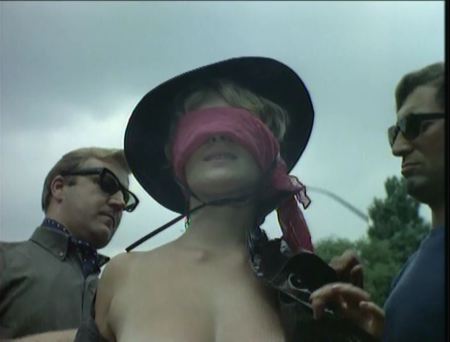

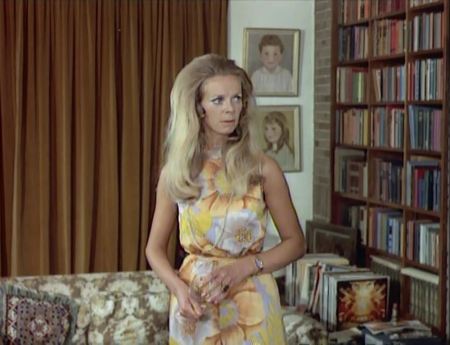
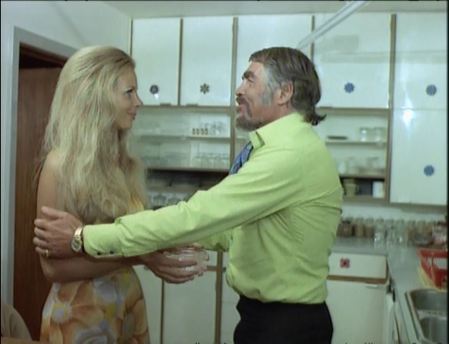
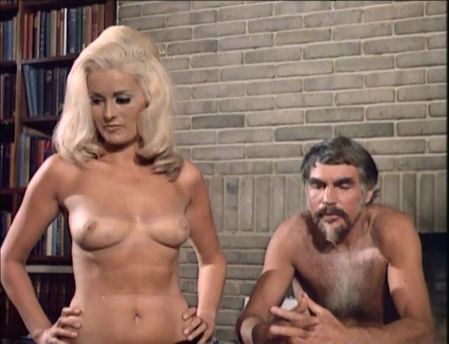



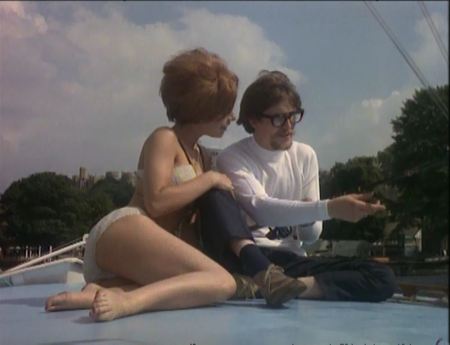


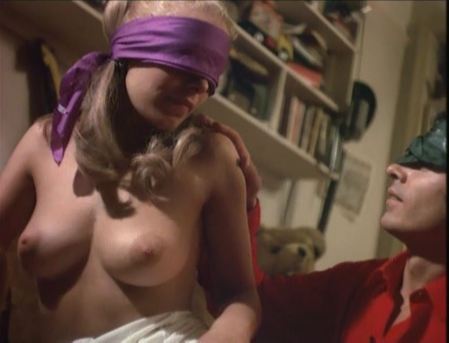
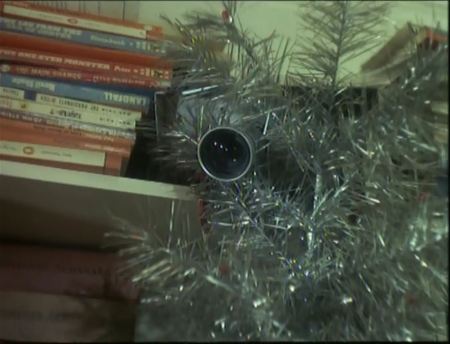

No comments:
Post a Comment